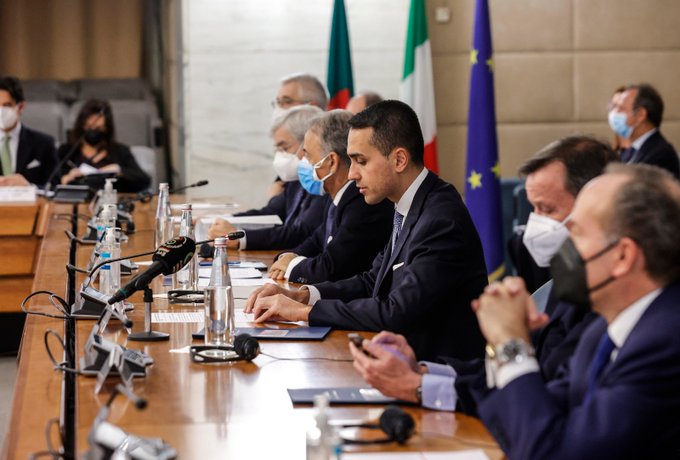Four months ago exactly, Domenico Quirico, who had entered Syria from the Lebanese border to report on the most advanced front of the civil war, disappeared. For eight weeks we had no news of our correspondent, who was last seen in the Homs district, one of the worst in the Syrian conflict. That agonising silence was broken on 6 June, with a phone call from Domenico to his wife Giulietta telling her, and us, that he’d been kidnapped.
Since then, our hope each day has been “This is it. This is the day we’ll see him again”. But fate has taken an arduous and complicated route: the contacts we thought were leading to a positive outcome were broken off and we were plunged once again into silent waiting.
Here at “La Stampa” we, like his family, have staked our hopes and trust in the work being done by our authorities, coordinated by the Foreign Ministry’s Crisis unit. And we have agreed to adopt a line of press silence and maintain the utmost reserve on the case because that seemed the best course of action to obtain results. But now contacts have been resumed. And as Foreign Minister Emma Bonino tells us, the mood is one of “cautious optimism” – a view echoed by Giampiero Massolo, Director of the Security Intelligence Department. The intention behind this interview is to send out a signal and provide an up-date after this long period of silence. And to let friends and colleagues know that the effort to help Domenico has not faltered, not even for a day.
Four months have gone by since Quirico was kidnapped. What’s your view, from the Farnesina, of the situation?
“We’re at a very delicate stage, and I’m not using a cliché here, because everyone clearly realises that everything is happening not just in highly complex conditions but also in a region where the people controlling the terrain are changing continually. Ramadan has just ended, and certain situations – which could also influence Quirico’s own situation – are seeing some movement”.
Minister Bonino, can you explain the situation on the ground, and what “movement” means in this context?
“To the complexity of the situation – that of war – we need, in these cases, to add the fact that the alliances are highly fluid, especially those on the anti-Assad side, which is extremely varied and mobile. And then new situations have emerged, like the opening of very bloody clashes between Kurdish and Islamist rebels. Things are also moving in the region where we think Domenico Quirico is being held, the region that’s the sphere of action of the group we think is holding him”.
But is all this just speculation or has progress been made?
“Certain channels that had closed have now opened again; they’re both real and extremely active. At present the activity is feverish – I can’t think of a more appropriate word to describe it – and it could lead to promising results”
Is that why both you at the Farnesina and Massolo, speaking for the intelligence services at his hearing before the [parliamentary] committee, are talking of “cautious optimism”?
“Yes, we’re hopeful that this activity will produce positive results. But be careful: this is a crucial time and we cannot commit communication errors that could undermine that positive outcome”.
You are still very cautious and continue to invite all the media to maintain their silence and reserve.
“That’s because we don’t think that talking too much brings any results. This is a time for silent, cautious work and for keeping below the radar. That holds for both Quirico and for Father Dall’Oglio. So I think it’s useless to fuss and shout, and anyway, who would I be yelling at?”
What information do we have on events in the region?
“The very large area where we think Quirico is located is one of constant armed fighting in a highly unstable scenario as regards control of the terrain. The Dall’Oglio case is further evidence of this: its characteristics are different but it confirms the danger of the situation, even for someone with good contacts among the groups operating in the region. Groups that Father Dall’Oglio knew very well”.
But in this scenario of instability and flux, is there any solid ground we can rely on?
“One point to note is that the position of the current leader of the anti-Assad coalition has been strengthened. His name is Jabra and he was elected recently at the Istanbul meeting, after weeks of talks”.
Which region and influence is he close to?
“He enjoys support from Saudi Arabia, unlike his predecessor, Sabra, who represented positions closer to Qatar and Turkey, which were the two countries supporting the Muslim Brotherhood in Egypt and Tunisia. And this leads us, of course, to extend the discussion to instability in the wider region. We’re witnessing a clash within the Sunni family, which at present sees the Saudis prevailing and which, along with other reasons, for example local economic and social discontent, led to the fall of Morsi. We must hope that Tunisia holds up”.
You met the Russian foreign minister. Did you discuss Syria and the cases of the kidnapped Italian nationals?
“Naturally. We shared information, and as regards the future scenario we both feel that there can be no military solution, just a laborious effort to bring people to the table at Geneva 2”.
In mid-July you met Giulietta Quirico and her daughter Metella and reassured them of your efforts on their behalf. Is there anything you can add today?
“First of all, I’d like to express to Domenico’s family, to his wife and daughter, my own and the Farnesina’s very active solidarity. And I’d like to remind them that we’re working day by day – patiently, stubbornly, and with a good dose of healthy realism. And that’s why we can cultivate hope”.


